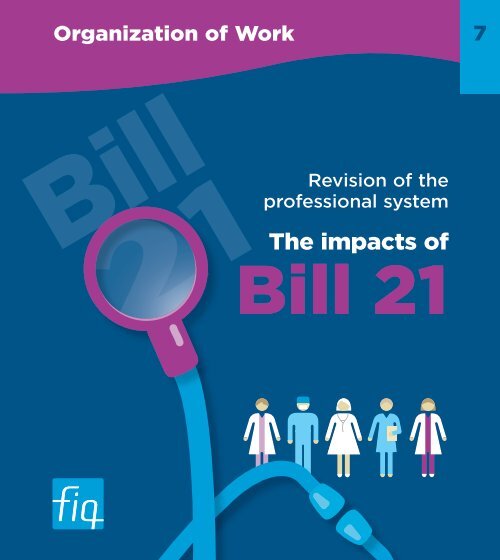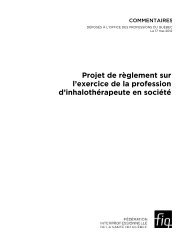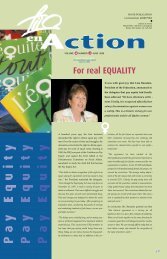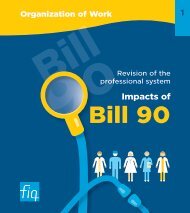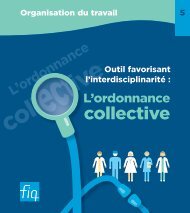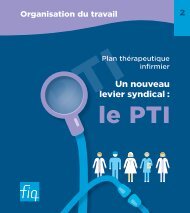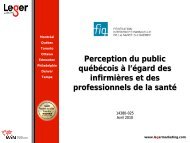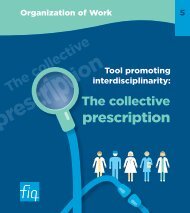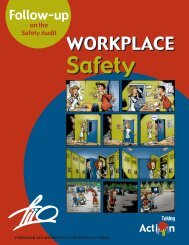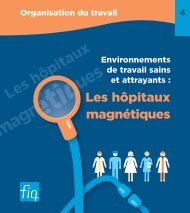Download - FiQ
Download - FiQ
Download - FiQ
- No tags were found...
You also want an ePaper? Increase the reach of your titles
YUMPU automatically turns print PDFs into web optimized ePapers that Google loves.
This brochure is intended for the FIQ local teams.It is the result of a collaboration between theTask and Organization of Work Sector and theCommunication-Information Service.Bill21Political OfficerSylvie Savard, 4 th Vice-PresidentCoordinationJulie Bouchard, Coordinator,Task and Organization of Work SectorResearch and written byMurielle Tessier, Union Consultant,Task and Organization of Work SectorRevision and productionSara Lapointe, Union Consultant,Communication-Information ServiceTranslationSusan Millroy, Union Consultant,Translation ServiceSecretariatFrancine ParentGraphic DesignJosée RoyPrintingSoliscoDecember 2012
Bill 21The first stage of the work on the modernization of the professional system inthe healthcare field resulted in the passing of an Act to amend the ProfessionalCode and other legislative provisions as regards the health sector, commonlyknown as Bill 90, in 2002. Although this Act came into effect in 2003, it has notreached its optimum deployment, in particular concerning the developmentof collective prescriptions. Efforts must continue to be made in this direction.Moreover, it is crucial to revise the professional activities in the field of mentalhealth and human relations to entrust the activities involving a risk of prejudiceto the professionals who possess the necessary knowledge and skills and toregulate the practice of psychotherapy. These changes are aimed at optimizingthe care and the services offered to the Québec population and to ensure thepublic’s protection. This second stage of updating the professional activitieswas finally completed in June 2009 with the passing of the Act to amend theProfessional Code and other legislative provisions in the field on mental healthand human relations: Bill 21.Bill 21, in effect since September 20, 2012, has significant impacts on thepractice and organization of work of the healthcare professionals working inmental health. Vigilance is needed to ensure that the changes made to theirroles, tasks, duties and responsibilities during reorganizations of work respectthe letter and the spirit of the Act. In addition, the organization of workshould promote autonomy, development and the recognition of knowledge,experience and the expertise of the healthcare professionals in order to havebetter results in the care given to a very vulnerable clientele.Therefore, it is necessary to be familiar with the main changes brought aboutby Bill 21 in order to grasp the opportunities that it presents and thus be ableto better intervene in organization of work.3
Quick look at Bill 21Professions coveredn Nursen Psychologistn Social workern Marriage and family therapistsn Vocational guidance counsellorn Psychoeducatorn Occupational therapistn Physiciann Speech-language pathologist/audiologistPurposen Guarantee the competency, accountability and integrity of theprofessional system in mental health and human relationsObjectivesn Abolish certain barriers in order to promote professionaldecompartmentalizationn Introduce flexibility and streamline the legal and regulatory frameworkn Increase interdisciplinarity and multidisciplinarityn Recognize and optimize the use of skills4
Main changesn A redefinition of the scopes of practice adapted to modern practice for eachprofessionn activities reserved for each profession (obligation for eligible stakeholders tobe a member of their professional order in order to perform certain reservedactivities)n Shared reserved activitiesn Common activities (information, promotion of health, prevention, includingsuicide prevention)n Conditions associated with certain reserved activities (training, experience)n A mechanism for recognition of vested rights for certain stakeholders,members or not of a professional order, with the goal of avoiding a breakin services (registration on a registry, continuous education regarding thepermitted reserved activities)n Framework for psychotherapy: definition, the practice of and the title ofpsychotherapist is reserved for physicians and psychologists and for themembers of the professional orders that can hold a psychotherapist permitand the administration of these permits by the Ordre des psychologuesdu Québec and the creation of an interdisciplinary advisory council on thepractice of psychotherapy5
The amendmentsReserved activities1. Assessment of mental disorders2. Assessment of mental retardation3. Assessment of neuropsychological disorders4. Assessment of a person suffering from a mental or neuropsychological disorder attestedby the diagnosis or evaluation of an authorized professional5. Assessment of a person further to a decision of the Director of Youth Protection or atribunal in the application of the Youth Protection Act6. Assessment of an adolescent further to a tribunal decision in the application of the YouthCriminal Justice Act7. Determination of an intervention plan for a person who suffers from a mental disorder orexhibits suicidal tendencies and who resides in a facility run by an institution operating arehabilitation centre for young persons with adjustment problems8. Assessment of a person with regard to child custody and access rights9. Assessment of a person who wishes to adopt a child10. Undertaking the psychosocial assessment of a person with regard to the protectivesupervision of a person of full age or with regard to a mandate given in anticipation ofthe mandator’s incapacity11. Assessment of a handicapped student or a student with a social maladjustment with aview to formulating an intervention plan according to the Education Act12. Assessment of a child not yet admissible to preschool education who shows signsof developmental delay, in order to determine the adjustment and rehabilitationservices required613. Making decisions on the use of restraint or isolation measures according to the Actrespecting health services and social services and the Act respecting health servicesand social services for Cree Native persons_________1. Must hold an attestation of additional training from her professional order.2. Must have the training and the experience required by regulation of her professional order.3. Must hold an attestation of training from her professional order.
Psychol. S.W. M.F.T. G.C Psychoed. O.T. Nurse Physicianx x 1 x 2 xx x xx 3x x x x x x x xxSpeech./audiol.xxx x xxxx x xx x xxx x x x x xx x x x x x xx x x x x xTable taken from the Guide explicative PL N o 21, Office des professions du Québec, p. 87.7
Assessments at the heart of the reservedactivities in Bill 21The activities reserved for the professionals refer to the assessments linked tothe identification of disorders, to the protection of vulnerable clients and clientsthat are vulnerable in certain legal contexts.“An assessment implies making a clinical judgment on an individual’ssituation using the information that the professional has and communicatingthe conclusions of this judgment. The professionals perform assessmentswithin the framework of their respective scope of practice.The reserved assessments can only be performed by skilled professionals.”(Office des professions du Québec, Guide explicatif PL n° 21, september2012, p. 27)This implies specific knowledge and skills, the clinical judgment of theprofessional and the communication of this judgment. The reserved assessments,as well as the communication of their conclusion, are connected to a higher riskof prejudice and they require an expertise. The professional is accountable forher assessment and her conclusions.What is not reserved by Bill 21n The determination of an intervention plan (except for the determination of anintervention plan for an individual with mental disorders or is a suicidal riskwho lives in an institution operating a rehabilitation centre for young personswith adjustment problems)n The detection, screening, evaluation, contribution to the diagnosis or theconclusion of an identification of a disordern The use of assessment tools by the professionals of different disciplines whoremain responsible for the choice of assessment tools according to the scopeof their practice8
The nurse’s scopeof practiceGeneral scope of practiceThe general scope of practice of a nurse has already been amended by Bill 90.Bill 21 only required an adjustment in the description of her scope consistent withthe revised description of the scope of practice of the other professionals in thefield of mental health and human relations, that is, “a person interacting with herenvironment”, reflecting the work performed with individuals, couples, families,groups, communities and organizations.“The practice of nursing consists of assessing health, determining andcarrying out the nursing care and treatment plan, providing nursing andmedical care and treatment in order to maintain and restore the health of aperson in interaction with his environment and prevent illness, and providingpalliative care.” (Nurses Act, R.S.Q., chapter I-8, sec. 36)Activities reserved for a nurseBill 21 adds three activities to the fourteen already reserved for a nurse in section36 of the Nurses Act (R.S.Q., chapter 1-8, sec. 36) since 2002. These threeactivities are reserved and shared with other professionals.First activity“15° deciding to use isolation measures in accordance with the Actrespecting health services and social services (chapter S-4.2) and the Actrespecting health services and social services for Cree Native persons(chapter S-5);”Isolation is a control measure with a high risk of prejudice. In an institution, theactivity must be performed within the framework of the rules or policies in theinstitution. It is a last-resort measure.9
Contrary to the activity on the decision for the use of restraint measures alreadyreserved for a nurse without restriction of location, the reserved activity ofdeciding to use isolation measures is reserved when it is taken in a facility maintainedby an institution in the sense of the Act respecting health services andsocial services and the Act respecting health services and social services forCree Native persons.10What is not reserved by Bill 21n The decision to use the measure in an emergency situationn An intervention in schoolsn Police servicesn Correctional officersn Ambulance services outside an institutionn The application of an isolation measure, as with a restraint measure, whenthese planned measures are documented in the intervention plan (themeasures must be applied according to the protocol adopted by the board ofdirectors in an institution)Second activity“16° assessing mental disorders, except mental retardation, if the nursehas the university degree and clinical competence in psychiatric nursingcare required under a regulation made in accordance with paragraph g ofsection 14;”The qualified nurse must hold a graduate degree, such as a master’s in nursingscience with a major in mental health and the clinical experience requiredby the Ordre des infirmières et infirmiers du Québec (OIIQ). The assessment isperformed according to the ICD (International Classification of Diseases) andthe DSM (Diagnostic and Statistical Manual on Mental Disorders). It includes a
degree of complexity and technicality requiring specific knowledge and skills.This assessment is considered to be a risk of serious prejudice.What is not reserved by Bill 21n The use of classification systems of mental disorders as well as the developedtools, such as the Indice de gravité d’une toxicomanie (IGT) (Index AddictionSeverity), to the extent that this does not lead to the assessment of mentaldisorders, but rather leads in the direction of an appropriate treatmentn The assessment of addiction problemsn The assessment of a crisis situationn The appraisal of the dangers (risk of attempted suicide or homicide)Third activity“17° assessing a child not yet admissible to preschool education who showssigns of developmental delay, in order to determine the adjustment andrehabilitation services required.”This reserved activity is aimed at specifying the nature and if possible the intensityof the difficulties or to conclude the presence of a disorder in order to orientthe rehabilitation and adaptation services required.What is not reserved by Bill 21n The detection, screening and evaluation of the global development of thepreschool age child.It is important to remember that the first reserved activity for a nurse in Bill 90,“assess the physical and mental condition of a symptomatic person” may beperformed on all people, whether they have already been diagnosed or not.11
Measures to prevent anydisruption in servicesThe transitional provisions for the vested rightsof the members of a professional order12The situation of nursesNurses who, on September 20, 2012, performed an activity now reserved onlyfor social workers, such as “the psychosocial assessment of a person with regardto the protective supervision of a person of full age or with regard to a mandategiven in anticipation of the mandator’s incapacity” and the employer requires herto continue to perform this activity are registered by the employer on a list thatis sent to the Ordre des travailleurs sociaux et thérapeutes conjugaux et familiauxdu Québec (OTSTCFQ). These nurses must pay the registration fees to theOTSTCFQ and follow six hours of continuous training every two years.In the event that the employer does not require the nurse to perform this activity,the nurses can ask the employer to register their names on the OTSTCFQ listand they can preserve this right for the purpose of eventually performing it. TheOTSTCF registration fees and the obligation of continuous training apply.The transitional provisions for vested rights for personsnot eligible for a professional orderThe specific situation of technicians on the mental health/psychiatric teamsin relation to the three activities reserved for the nurseThe Rapport des coprésidents de la Table d’analyse de la situation des techniciensœuvrant dans le domaine de la santé mentale et des relations humaines(February 2011), the product of the work undertaken in 2009 and in which theFIQ participated, made it possible to specify the duties assigned to the techniciansin special education (SET), in social assistance (SAT) and in delinquencyintervention (TDI) in particular. This report also highlighted the pertinence ofallowing an eventual sharing of the activities reserved for professionals by Bill 21and the pertinence of integrating these technicians into the professional system.
Ultimately, the technicians were not integrated into the professional system.However, the transitional provision for vested rights stipulated in Bill 21 can applyto certain SETs who perform the activities now reserved for professionals. Thatis the case of only one of the three activities reserved for the nurse. In that, theOffice des professions du Québec followed the recommendations in the report.Assessment of mental disordersThis activity is not covered by the provision on vested rights.The assessment of a child not yet admissible to preschool education whoshows signs of developmental delayAfter analysis of the training programme and the interventions in the field,the SETs do not have the skills to perform this activity. However, certain SETscan benefit from the vested rights clause if they performed the activity onSeptember 20, 2012 and they were registered on the registry of the professionalorder concerned.The decision to use restraints or isolation measures within the framework ofthe application of an Act respecting health services and social services andan Act respecting health services and social services for Cree Native personsThe technicians contribute to the decision, but do not perform the reservedactivity. That activity is not covered by the provision on vested rights.13
What about the licensedpractical nurse?Even if the licensed practical nurse is not directly covered by Bill 21, her generalscope of practice still allows her to:“[…] participate in the assessment of a person’s state of health and in thecarrying out of a care plan, provide nursing and medical care and treatmentto maintain or restore health and prevent illness, and provide palliativecare;” (Professional Code, R.S.Q., chapter C-26, sec. 37p)This descriptive field of professional practice, as well as the reserved activitiesthat can be performed within the scope of their professional practice confirmthe significant contribution of licensed practical nurses in mental health and theplace they can continue to occupy in this field.It is therefore important to have the scope of practice and the skills of thelicensed practical nurse in mental health recognized in all reorganizations ofwork in mental health in progress or to come.14
The frameworkof psychotherapyDefinition of psychotherapy in Bill 21“Psychotherapy is psychological treatment for a mental disorder, behaviouraldisturbance or other problem resulting in psychological suffering ordistress, and has its purpose to foster significant changes in the client’scognitive, emotional or behavioural functioning, his interpersonal relations,his personality or his health. Such treatment goes beyond help aimed atdealing with everyday difficulties and beyond a support or counsellingrole.”Psychotherapy is already part of the physician’s and psychologist’s professionalscope of practice. Like certain members of other professional orders in the fieldof mental health and human relations, some nurses can perform psychotherapy ifthey hold a psychotherapy permit from the Ordre des psychologues du Québec,according to the regulation issued by the Office des professions du Québec.A mechanism for the recognition of vested rights has been implementedfor those persons who performed psychotherapy on September 20, 2012.Certain conditions apply and are explained in the Guide explicatif de la Loi 21(Explanatory Guide to Bill 21).What is not reserved by Bill 21n A support meetingn Support interventionn Marriage and family interventionn Psychological educationn Rehabilitationn Clinical follow-upn Coachingn Crisis intervention15
Organization of work,an essential keyTurmoil, changes and the successive reorganizations in the health and socialservices sector have not ended with Bill 21 which has just come on the scene inthe institutions in the health and social services network.The deployment of Bill 21 will require adaption, accommodations, reflections andactions in our workplaces to ensure that the practice of all the professionals andnon professionals in the field of mental health and human relations takes placewithin the interdisciplinary teams concerned with the health of the population,the quality and the safety of the care and services.The explanatory document on the Bill is not a guide on organization of work.However, the latitude that the employers have in the use of their labour forceand the composition of the work teams must ensure that the reorganizationsand rearrangements imposed by Bill 21 going into effect respect professionalautonomy, competencies and the specificities of nurses and licensed practicalnurses in their valuable contribution to the health and care given to the clientelein mental health and in psychiatry.The organization of work and the care is therefore a determining factor inattaining the best results possible for this particularly vulnerable clientele.For the FIQ, a better knowledge of the scopes of practice of the healthcareprofessionals remains the key in the optimum use of their skills in all the areas ofintervention, whether it is in the community or in the hospital setting and in theresidential setting, and at all levels of dispensation of care and services: in firstline,second-line and third-line care.16
FIQ Montréal | Head Office1234, avenue Papineau, Montréal (Québec) H2K 0A4 |514 987-1141 | 1 800 363-6541 | Fax 514 987-7273 | 1 877 987-7273 |FIQ Québec |1260, rue du Blizzard, Québec (Québec) G2K 0J1 |418 626-2226 | 1 800 463-6770 | Fax 418 626-2111 | 1 866 626-2111 |www.fiqsante.qc.ca | info@fiqsante.qc.ca


